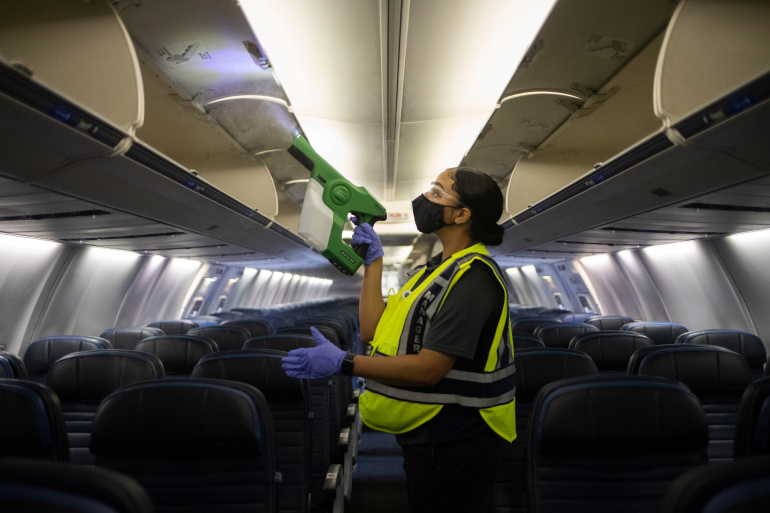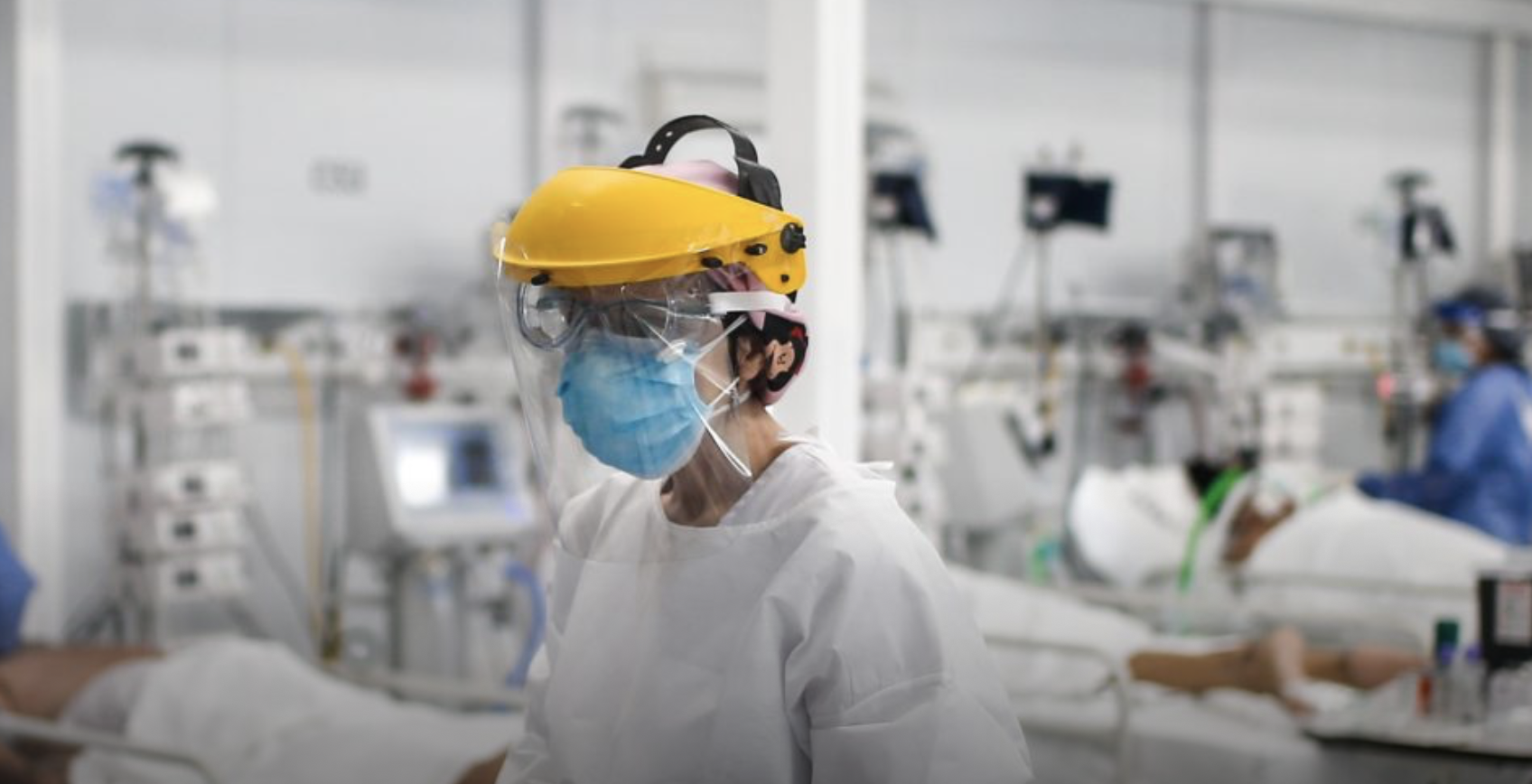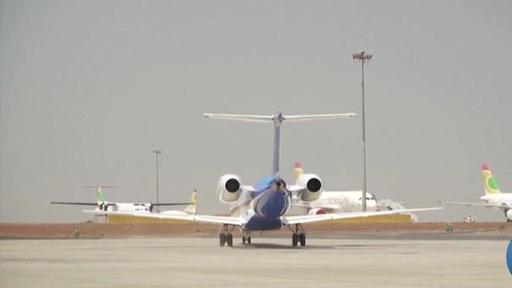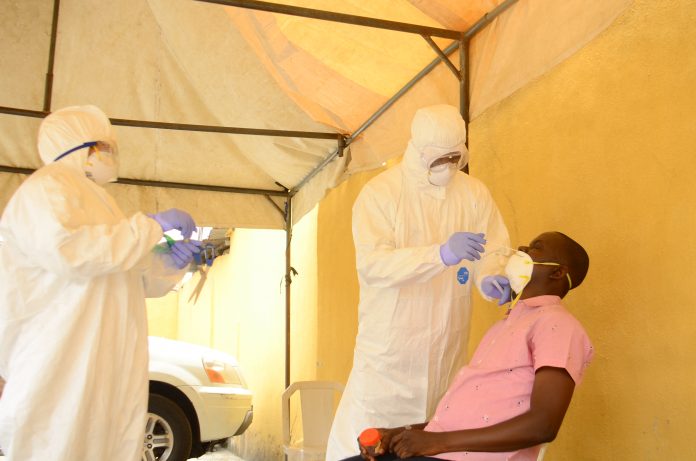Global airlines are calling for airport coronavirus tests for all departing international passengers to replace the quarantines they blame for exacerbating the travel slump.
Rapid and affordable antigen tests that look for pieces of the coronavirus in swab samples from people’s noses and throats – and that can be administered by non-medical staff – are expected to become available in the “coming weeks” and should be rolled out under globally agreed standards, the head of the International Air Transport Association (IATA) said during an online media briefing.
“We don’t see any alternative solution that would be less challenging or more effective,” IATA Director General Alexandre de Juniac said.
Airlines hammered by the coronavirus pandemic are pressing governments to embrace alternatives to blanket travel restrictions that are still hampering a traffic recovery – and that are now tightening again in Europe amid resurgent case numbers.
With rapid antigen tests becoming available for as little as $7 each, de Juniac said, airlines will push for their use to be endorsed by the International Civil Aviation Organization, the United Nations agency that oversees global aviation rules.
IATA believes production could be quickly increased to millions per day and the tests phased in between late October and the end of the year, “helping to save a part of the winter season”, de Juniac told Reuters television.
A global agreement is needed to ensure predeparture test results are uniformly accepted by the destination country, he said, adding, “It will also boost passenger confidence that everybody on the aircraft has been tested.”
Evolving position
The airlines’ position has evolved alongside testing technology. IATA argued a month ago for new rules to recognise laboratory-based polymerase chain reaction (PCR) tests – which also look for virus fragments – conducted 48 hours before departure.
Last-minute airport screening is more effective because it “seals off the system” against forged certificates or infections contracted just before travel, de Juniac said on Tuesday.
Antigen tests are faster but less sensitive and therefore slightly more likely to miss positive cases than the PCR alternatives, although the accuracy gap has narrowed.
Among companies marketing the new tests, German diagnostics specialist Qiagen said earlier this month that it planned to launch a COVID-19 antigen test that provided results in 15 minutes and could be deployed in airports or stadiums.
Source: Al Jazeera
COVID-19 may damage immune cells in the bone marrow.
Even bone marrow may not be a safe harbour from the ravages of COVID-19, according to a study that found previously unrecognized changes in newly produced immune cells, called monocytes, released into the blood from bone marrow. To learn more about how the body responds to COVID-19, researchers obtained serial “snapshots” of patients’ immune health by analyzing their immune cells at multiple points during their hospital stays. In COVID-19 patients with more severe disease, the monocytes do not function properly, researchers reported last week in Science Immunology. It was not yet clear whether the monocytes are being released from the bone marrow in an altered state or whether the alterations happen after monocytes enter the blood, coauthor Tracy Hussell of the University of Manchester in the UK told Reuters. Either way, she said, treatments that prevent their release from the bone marrow may help reduce the exaggerated immune response that contributes to poor outcomes in patients with severe COVID-19. (https://bit.ly/3mziJls)
COVID-19 reinfections occur but remain rare
Another case of reinfection after recovery from COVID-19 has been reported, this time in a healthy young military healthcare provider at a U.S. Department of Defense hospital in Virginia. He was first infected by a patient in March. He recovered within 10 days and “returned … to excellent health,” his doctors reported on Saturday in Clinical Infectious Diseases. Fifty-one days later, he was reinfected by a household member. Genetic studies showed the first and second infections to be from slightly different strains of the virus. The reinfection made him sicker, perhaps because the second strain was more potent, or the household contact infected him with a higher load of the virus, doctors said. It was also possible antibodies from the first infection may have triggered his immune system to respond more strongly to the virus the second time his body encountered it. COVID-19 reinfections are still rare, they said. Kristian Anderson, professor of immunology and microbiology at Scripps Research in La Jolla, California, recently told Reuters virus reinfections are always possible. “We don’t know at what frequency reinfections (with the new coronavirus) occur and how that might change over time,” Anderson said. Without further studies, “we can’t conclude what a single case of reinfection means for longevity and robustness of COVID-19 immunity and relevance for a future vaccine,” she added. (https://bit.ly/2Hln23P)
Proven immunotherapy approach might be possible in COVID-19
A proven approach to severe virus infections, known as cytotoxic T cell therapy, may apply to COVID-19 despite a potential hurdle, researchers said. The approach involves treating critically ill patients with infusions of key immune cells known as T-lymphocytes obtained from people who successfully fought off the same virus. These donor T cells have learned to recognize and target the invading virus. But steroids, which are being increasingly used to treat COVID-19 patients, are toxic to lymphocytes, likely cancelling out any beneficial effects of the immunotherapy. In a new report posted on bioRxiv ahead of peer review, researchers describe a possible workaround. They say they have figured out a way to take donor T cells that target the novel coronavirus and make them resistant to the deadly effects of steroids. “We are currently working on … developing clinical trials to determine safety and efficacy,” coauthor Dr. Katy Rezvani of The University of Texas MD Anderson Cancer Center told Reuters. (https://bit.ly/3hNL83x)
High COVID-19 mortality was seen in assisted-living facilities
Data compiled from more than 4,600 assisted living facilities in seven U.S. states through the end of May showed a four-fold higher COVID-19 fatality rate than in the nearby communities, researchers reported on Monday in the Journal of the American Geriatric Society. In North Carolina and Connecticut, for example, the proportions of COVID-19 cases that were fatal across the state were 3.3% and 9.3%, respectively. In assisted living facilities in those states, the fatality rate climbed to 13% and 31.6%. Unlike nursing homes, assisted living communities are not subject to federal regulation and are not required to collect and report data on COVID-19, coauthor Helena Temkin-Greener of the University of Rochester School of Medicine & Dentistry said in a news release. In this study, and in a separate study of nursing homes her team published on Monday in the same journal, COVID-19 cases were more common in facilities with more minority residents and more residents with dementia, chronic obstructive pulmonary disease, and obesity. “Assisted living communities and their residents urgently need local, state, and the federal governments to pay at least the same level of attention as that given to nursing homes,” Temkin-Greener and colleagues conclude.
Source: Reuters
Africa's network of airlines could take up to three years to rebound from the devastating impact of coronavirus-related travel restrictions, say, industry insiders. But this global crisis has also allowed the battered industry to rethink and plan for a new, different way of doing things. VOA's Anita Powell reports from Johannesburg.
Source: Voice of America
The General Assembly on Friday adopted an “omnibus” resolution to encourage international cooperation in response to COVID-19.
The resolution, which was adopted 169-2 with two abstentions, identifies international cooperation, multilateralism and solidarity as the only way for the world to effectively respond to global crises such as COVID-19.
It acknowledges the key leadership role of the World Health Organization and the fundamental role of the UN system in catalyzing and coordinating the comprehensive global response to COVID-19 and the central efforts of member states.




